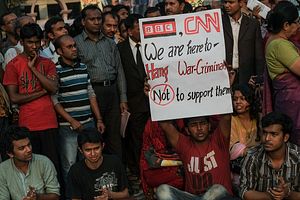The trial of war criminals for their atrocities against civilians during the War of Liberation of Bangladesh has been ongoing since the first indictment in 2010. However, the principal perpetrators, the members of the Pakistan Armed Forces, have escaped justice. Indeed, there are some in Bangladesh who question the validity of the ongoing trials of Bangladeshis who were collaborators of the Pakistan Armed Forces on the ground that main perpetrators, who remain in Pakistan, have escaped trial (though their motives for making this claim are more complicated).
It may not be known to many that the Pakistani authorities themselves promised that persons who may be responsible for crimes committed during the Liberation War of 1971 would be held accountable. Islamabad made the commitment in the course of their application to the International Court of Justice (ICJ) for the repatriation of Pakistani prisoners of war (POWs) from India to Pakistan. In essence, Pakistan claimed that under the Geneva Conventions of 1949 and the Genocide Convention, 1948, India was under an obligation to promptly repatriate POWs to Pakistan. According to Pakistan, the allegations involved genocide and could not amount to crimes against humanity or war crimes — since, during the war, Bangladesh was a part of Pakistan, only Pakistan could try the alleged offenses, the argument went. In particular, the Pakistani argument was that even if an international tribunal could try the POWs, there could not be any such tribunal in Bangladesh because of the prevailing hatred toward the alleged perpetrators.
On June 4, 1973, Yahya Bakhtiar, Pakistan’s attorney general at the time and chief counsel in the case, in the course of his oral arguments before the ICJ, quoted a previous government statement: “The Government of Pakistan reiterates its readiness to constitute a Judicial Tribunal, of such character and composition as will inspire international confidence, to try persons charged with the alleged actions.”
India denied the ICJ’s jurisdiction to decide the case and did not take part in the proceedings. Ultimately, on December 15, 1973, at Pakistan’s instance, the case was taken off the registry of the ICJ without any formal judicial settlement. However, that in no way detracts from Pakistan’s promise to try the perpetrators of crimes committed during the war.
The resolve of the post-independence leadership of Bangladesh to try the members of Pakistan Armed Forces is well documented in the submissions of the Pakistani counsel to the International Court of Justice. However, geopolitical impulse (chiefly the recognition of Bangladesh as a sovereign state) and the consideration of the safety of hundreds of thousands of Bengalis stranded in Pakistan tied in the hands of Bangladeshi authorities. As Professor Gary J. Bass of Princeton University has argued, the victory of Bangladesh was not as militarily decisive as in the case of World War II, after which the victors could try the crimes of the vanquished. And as a consequence, it was not feasible for the leadership of Bangladesh to cling on to the policy of demanding that members of the Pakistan Armed Forces be tried by a tribunal in Bangladesh.
In the decades that followed, the promised accountability of those responsible for the atrocities in Bangladesh has not materialized. Pakistani authorities have never formed any judicial tribunal to try those who were responsible for crimes that they conceded could amount to genocide. Such a reversal in Pakistan’s direction has not only meant complete disregard for the innumerable victims of the atrocities of the Pakistan Armed Forces, but it has also played a role in creating a culture of impunity for the Pakistan Army and paved the way for the militarization of Pakistani politics. Arguably, if the accused officers of the Pakistan Armed Forces had been forced to be answerable for their crimes, it could have set a precedent that the Pakistan Army is answerable to the law and thus heralded a new era in the politics of Pakistan.
Thus, the long-overdue trials are not only necessary for healing the wounds of millions of Bangladeshis, but also for Pakistan. Even in the absence of cooperation from the Pakistani authorities, a trial in absentia should be conducted to judicially determine the culpability of the perpetrators of one of the worst atrocities that the humankind had witnessed in the 20th century.
Md. Rizwanul Islam is an Associate Professor at School of Law, BRAC University.

































